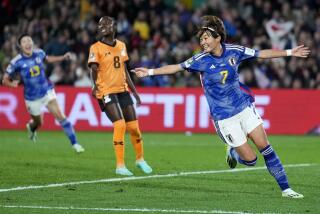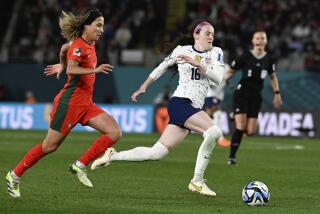No Treat for Loser in Holland : Soccer: English and Dutch meet again tonight, with winner in position to reach next year’s World Cup finals.
- Share via
ROTTERDAM, Netherlands — History is replete with tales of the seagoing battles between the Dutch and English, powers that fought fiercely around the world to gain lands and open new markets.
Rarely, though, did the fighting occur on Dutch or English soil, which has perhaps allowed these European countries to maintain mostly cordial relations.
Sport is often exempt from the attention of historians, however, and they would no doubt be alarmed at the military symbolism attached to tonight’s crucial World Cup qualifying game between the Netherlands and England.
Battle, war, fight and even Mission from God are expressions that have been associated with a game that will be played at the 48,000-seat Feyenoord Stadium, the largest in the Netherlands. The winner probably will play in next summer’s World Cup finals, to be held in the United States for the first time. The loser will stay home, sulking.
Neither of these two nations, with their rich soccer traditions, finds appealing the prospect of missing the single largest sporting event in the world. Thus the battle lines have been drawn since World Cup qualifying began two years ago and the longtime rivals found themselves in Europe’s Group 2.
The reputations of the Dutch and the English teams have dimmed slightly since parity came to international soccer, but the notoriety of some of the teams’ fans remains prominent. War is surely an apt word for the pitched battles between rival gangs of hooligans that have plagued recent international games involving England or Holland.
The behavior of both teams’ fans will be closely monitored tonight. FIFA, soccer’s international governing body, has identified the game as “high risk.” World Cup ’94 has dispatched a team of its security experts to observe the preparations and English police have been working for weeks with Dutch officials.
About 5,000 English fans are expected and already 114 have been arrested for public drunkenness and violence after large groups of English supporters attacked passersby in Amsterdam’s red-light district on Monday and Tuesday. Thirty were deported and turned over to British police. German and Danish police have been on the alert for hooligans traveling through those countries on their way to Holland.
Soccer officials in Holland and England are weary of the attention paid to hooliganism, which, although still a serious problem, appears to be on the wane.
Talk of potential violence has been particularly galling this week for the coaches and players as they prepared for the decisive game.
“Decisive? I think you can look at it that way,” said England’s captain, David Platt. “We have to wait until the group final. But at the end of the day, if we win, more or less, we will qualify for the United States.”
In England, especially, the game is being called the most important for the national team since England met Germany in the semifinal of the 1990 World Cup. England lost and finished fourth.
Then again, the way these teams have been playing, this is seen by some as the most important game . . . since their last World Cup qualifying match a week ago.
Much has been made of the turmoil on the English team--the precarious job security of Coach Graham Taylor, injuries to key players and the absence of the volatile but brilliant Paul Gascoigne, who is recovering from an injury but would be unavailable anyway because of a suspension.
But it is the Dutch who are unsettled. The team’s two best players--among the best in the world--won’t be playing.
Ruud Gullit refuses to play for Coach Dick Advocaat. Gullit, who plays for Sampdoria in the Italian league, says he will rejoin the national team only when Johan Cruyff, the players’ favorite, takes over as national coach at the end of May.
The other player, Marco Van Basten, can’t play. Van Basten, the European player of the year in 1992, is recovering from an ankle injury that many thought would end his career.
Pressure is on striker Denis Bergkamp, the 24-year-old who was recently transferred from the Amsterdam club Ajax to Inter Milan in the Italian league for nearly $23 million. Bergkamp has not responded well to pressure so far, scoring only one goal in league play for Inter Milan.
The Dutch have called up 22-year-old Uli Van Gobbel to counter England’s speed. Van Gobbel, considered one of the fastest players in the world, has been timed in 10.6 seconds over 100 meters. The central defender will be paired with his club teammate, Johnny De Wolf. They play for the powerful Feyenoord team, and tonight’s game will be on their home ground.
Also on defense for Holland will be Ronald Koeman, who will be asked to stop the powerful English strikers.
Most experts expect a draw, so closely are the teams matched. The Dutch have been beaten at home only once in 21 years through 35 World Cup and European Championships qualifiers.
Taylor favors an attacking style, using speed on the wings and ball control. The few instances when the English coach veered from that course have been disastrous. Taylor uses a 4-4-2 alignment, without a sweeper, and for that he has been criticized.
He has been given credit for putting his team in a positive frame of mind, despite injuries to Stuart Pearce, striker Les Ferdinand and the possible loss of potent goal scorer Ian Wright.
But the team is heartened by the return of Alan Shearer, who spent nine months rehabilitating a knee injury. In the absence of the emotional Gascoigne, Shearer is seen as the team’s lightning rod.
“No one needs to tell any of our team how big this game is,” he said. “If we don’t get a point or two, there will be no World Cup.”
The English players, whose team symbol is a bulldog, are not in a reflective mood this week.
The Dutch have been as reserved, as usual.
Said veteran Frank Rijkaard: “You never know. The ball is round, as we say in Holland.”
The Situation
If England wins: It would need only a draw against winless San Marino next month to advance. If the teams draw: A victory over San Marino will advance England, unless the Netherlands beats Poland. If that happens--because of Holland’s lead in goal differential--England must score four goals more than the Dutch.
If Holland wins: Poland may ultimately determine the fate of both countries. If the Poles beat both Norway and Turkey, their last game, against the Netherlands, will determine if the Poles or the Dutch advance. No number of goals by the English against San Marino would advance them.
Two teams from Group 2 will advance. Group leader Norway hopes for any result in Rotterdam but a draw. A victory by either Holland or England will advance Norway outright, regardless of how the Norwegians do against the Poles tonight. If the England-Holland game is a draw, Norway will still need one point to advance to the World Cup finals.
Group Two Standings
Country GP W L T GF GA PTS Norway 8 6 0 2 21 3 14 Holland 8 4 1 3 24 8 11 England 8 4 1 3 19 6 11 Poland 7 3 2 2 8 7 8 Turkey 8 1 6 1 7 17 3 San Marino 8 0 7 1 1 39 1
Remaining games: Today, England-Holland, Poland-Norway. Oct. 27, Turkey-Poland. Nov. 10, Turkey-Norway. Nov. 16, San Marino-England. Nov. 17, Poland-Holland.







